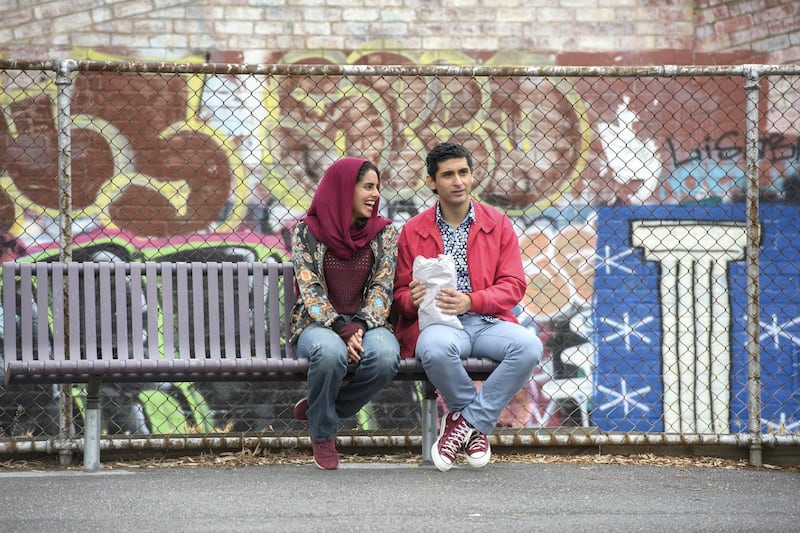"My dad has a saying: 'A lie begins in the soul ... and travels the world.'" These words have proven prophetic for Osamah Sami, the star and co-writer of Australia's first Muslim rom-com, Ali's Wedding. It's a sweet-as-custard movie based on his own mad life of catastrophic lies – and has now gone global thanks to Netflix.
From faking his university admission to Melbourne Medical School to bailing on his arranged marriage, life has been stranger than fiction for this 35-year-old stand-up comic and author, whose irreverent, warm-hearted comedy also affords a rich and vibrant glimpse into Islamic life Down Under.
In the movie, Sami portrays Ali, the neurotic, naive and musically gifted eldest son of Muslim cleric Mahdi (Don Hany). After fibbing about his grades, Ali soon sees his "white lie" about medical school spiral out of control.
All his medical school “success” has made him quite the catch, and he soon finds himself promised to Yomna (Maha Wilson), a girl at his father’s mosque. But there’s a wrinkle, and it’s a huge one: he’s already madly in love with Dianne (Helana Sawires), an Australian-born Lebanese girl.
Click to watch the trailer:
Winner of an Australian Academy Award for best original screenplay and based on Good Muslim Boy, Sami's critically acclaimed book, Ali's Wedding succeeds by choosing to focus on the universality of the human condition and the things we have in common, rather than compare cultures or point out our differences. The film won the Audience Award for Best Narrative Feature at last year's Sydney Film Festival.
"Thematically, it's very universal," says first-time feature director Jeffrey Walker. "We sought to limit the divide between all the various Australians that are captured in the film.
"What we ultimately end up talking about are family pressures, love and the things that ultimately affect all of us, regardless of our background."
"It's a film. It's not a didactic. It's not a manifesto," says Sami, himself the son of a Muslim cleric, whose family came to Australia as Iraqi refugees. "It's a story that transcends the screen. It's a story of love, and it doesn't matter who you are or what's the colour of your skin – love's always a win, you know."
Raised with the expectation that he would become a doctor, Sami had everybody fooled – at least at first.
Based on a true story
“At the start, the lie was fine,” he recalls. “I was catching a tram, getting to Melbourne Uni. It was all good. I made some friends. And I felt like I kind of belonged. I’m sitting in lectures, and suddenly you believe your own lies.
“One thing leads to another. There was such immense community pressure. My father was an imam, a very important man in the community and my hero, as well. I felt that if I failed, people would see Dad as failing. It just crushes you and you feel you can’t breathe and everybody builds you up to be something that, inside, you know you’re not. And it’s not the path that you really want to follow.”
So why not just tell the truth?
"At the time, I felt it was impossible.," he says, suggesting his parents would have branded him "a loser". "Everything that Dad and Mom had gone through, the war and migrating to here – when parents work so hard to bring you here – and all you have to do is open your book and study a few hours a day, that is the expectation. And we've already got too many taxi drivers. That's the thing with us, as Arabs [here in Australia]: you're either a doctor, a lawyer or a taxi driver."
_______________________
Read more:
Netflix drama The Protector may effect change in Turkish TV
The stars of Netflix's reboot 'Lost in Space' discuss the new show
Your guide to online video streaming in the UAE in 2018
_______________________
Sami's real-life arranged marriage lasted exactly one hour and 40 minutes, before he ran away, still in his tuxedo, with his pockets full of wedding cash, and went into hiding. He says he knew his family would never accept the girl he fell in love with at school because she was neither Muslim nor Iraqi. Despite his experience, however, he still has a few kind words for hand-picked couples.
“You think of arranged marriages and straight away, it’s loaded – it’s negative,” he says. “But it’s not always. My parents were arranged, and they were married for 30 blissful years. They were madly in love and together. It works for some people. It doesn’t work for others. “At the time it was happening to me, I lacked that courage until the wedding night, when I thought: ‘Oh no, I don’t want to do this, man.’ And I just bolted.”
Sami's father never got to see Ali's Wedding; he passed away before the film was made. But did he ever forgive his talented son for all the lies?
"I know he did," Sami says. "And I wish I could tell him face to face what he meant to me. Sometimes we don't tell those who we love that we love them, until ..." His voice trails off. "But he knows, he feels it."
Sami also hopes that Ali's Wedding will help to dispel some myths and stereotypes about Muslim communities in Australia.
“We’re spoken of, but not heard from,” he says. “There’s always an opinion about us – but it’s not from us. We belong here, and we are part of the Australian narrative, but how can we assimilate, as we’re always told, if we don’t see ourselves reflected?”
For Walker, meanwhile, his more modest storytelling goals have been achieved: "People laugh," he says of the movie. "People feel good about themselves. I think Ali's Wedding makes you feel good."
Ali's Wedding is available to stream on Netflix





